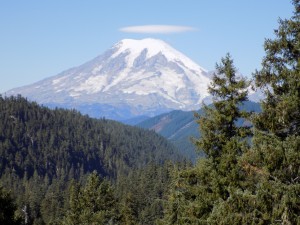 Let’s begin with a neurological reality: we humans are limited in what we can experience. The finite human nervous system can only absorb about 10% of the information around us. The other 90% goes unprocessed: unseen, unheard, untasted, untouched, unfelt–unimagined.
Let’s begin with a neurological reality: we humans are limited in what we can experience. The finite human nervous system can only absorb about 10% of the information around us. The other 90% goes unprocessed: unseen, unheard, untasted, untouched, unfelt–unimagined.
Mind you, that’s only talking about what lies within earshot and vision. It’s not even including what’s far from us, from ocean depths out to the stars, far in the past, or deep in the future.
Grasp an apple. You can see it, feel it, touch it, taste it, smell it. Your senses are all over it. But try tasting, touching, smelling even the nearest star. It’s nothing but a featureless point of light. Even if you turn a telescope on it, it becomes only a slightly bigger point of light. With increasing technology, we can measure stars. We can use instruments to analyze them, understand their workings. But no one now alive will experience even the nearest star the way we experience our own sun–let alone the way we experience that apple. Yet the more we learn about stars, the more amazing they become.
That pushes us toward an important word: “transcendence.” Most atheists I know, avoid that word. I can see why. Among atheists and believers alike, it’s a stereotypically “religious” word. It’s used to imply that something is beyond material experience, beyond the physical laws of the universe.
I’m an atheist, too, but I disagree with that definition. In Webster’s Dictionary, the more standard definitions are the real-life ones: “exceeding usual limits” and “lying beyond the limits of ordinary experience.” Well you know what? Most physical reality does that–simply because there’s so much reality out there. Under the dictionary definition, applying what neuroscientists now know about our nervous systems, 90% of everything around us is, in fact, transcendent!
To the ancients, of course, those stars were supernatural: put there by God (or before that, by the gods.) It took thousands of years of advancing observation and calculation to assay the miles between us and even that nearest star. We’ve kept the ancients’ sense of magic but we’re looking for it in the wrong place.
We walk half a day to go a dozen miles; we drive for a week to cross a continent. We can experience that. But even today, the mind cannot wrap itself around the trillions of miles to the nearest star, which we now know as Proxima Centauri. The naked eye can’t even see Proxima Centauri because it’s hidden by other stars in its cluster. It wasn’t discovered until 1915. The ancients didn’t even know it existed. There’s some transcendence for you!
Want to have more fun? Come up with some transcendence of your own. It’s not that difficult–and a healthy exercise!
But let’s go back to that apple. Even with that apple, our senses only get us so deep. To understand the sugars, carbohydrates, molecules, atoms, protons, electrons that make up that apple–we again must turn to technology and the accumulated insights of the ages. Unaided, our senses cannot experience even the ultimacy of an apple. A wormy apple (particularly a wormy apple–at least a wormy apple is being honest with you) hanging on the tree in my back yard, is transcendent. There’s so much about it I still don’t know. Wanting to know–getting a kick out of some subtle new piece–is the on/off switch to transcendence.
I am an atheist. But I consider myself deeply religious. As far as I’m concerned, religion is not just about God, heaven, hell, angels, the afterlife. Religion is bigger than those things. Religion is about humility, compassion, commitment, and engagement.
To put it a different way: I like science. I like experience. I like poetry. I like deep questions, exploring the deep meaning of my life, my actions. I want to be a better person. Those are the things that make me religious.
Transcendence has everything to do with that. It doesn’t have anything to do with God.
Science, experience, poetry–including, by the way, the poetry of traditional “religious” expression–are all ways to help us touch that 90% of reality that our nervous systems–therefore our limited minds–can’t reach. It’s a very fine word, transcendence. It expresses the gift and challenge of exploring beyond the automatic: beyond what we think we already know.
Confined within my finite network of neurons, my mind yearns into the transcendent. I resolve to the ongoing attempt–even while acknowledging that society and my own subconscious conspire against it.
“The world offers itself to our imagination,” to steal my favorite line from poet Mary Oliver. We journey through the poem that is the world: immeasurably larger than our senses or who we think we are or what we think we know. The world asks questions. You may not have the answers. I know I don’t.
There’s an element of risk when you invite the transcendent. It’s totally not for sissies. If you’re going to go seeking you’ll have to resign yourself to uncomfortable moments. To breach the mystery, you’re going to have to engage the worm right along with the rest of the apple. All too often, that’s where the transcendent is hiding.
Wonderfully said!
Wow, thanks, Mark. You ain’t exactly chopped liver, yourself!